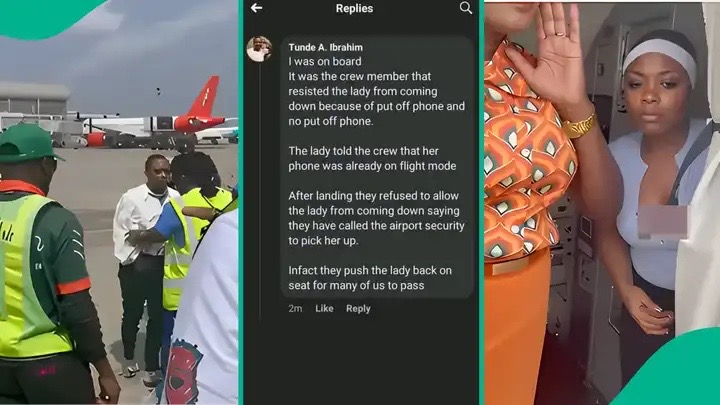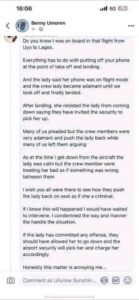Eyewitness Narrates What Happened Between Ibom Air Passenger and Cabin Crew
The controversy surrounding the dramatic removal of an Ibom Air passenger, Comfort Emmanson, has deepened after an eyewitness offered a different account of events, challenging the airline’s official position.
Emmanson, who was filmed being escorted off the aircraft and later remanded in Kirikiri Prison, is accused of assaulting a cabin crew member during a Uyo-to-Lagos flight on Sunday. Ibom Air has since issued a lifetime ban against her, alleging she refused to switch off her phone before take-off despite repeated instructions from the crew.
In a statement, the airline claimed that the passenger’s non-compliance escalated into a violent confrontation, prompting the intervention of airport security upon landing.
However, an eyewitness, Tunde A. Ibrahim, who said he was on board, offered a different narrative. According to him, the disagreement began when the cabin crew insisted Emmanson turn off her phone, even after she explained it was already in flight mode. He alleged that upon arrival in Lagos, she was stopped from leaving the aircraft and told that security had been called to take her into custody.
“They refused to allow the lady to come down, saying security was on the way. In fact, they pushed her back onto her seat so the rest of us could pass,” Ibrahim recounted.
The incident has sparked debates on social media, with some defending the airline’s strict adherence to aviation safety protocols, while others argue that the situation could have been handled more professionally.
Compounding the controversy is public outcry over perceived double standards, as critics point to similar incidents involving celebrities, such as veteran Fuji musician Wasiu Ayinde, popularly known as Kwam1, who allegedly assaulted an airline staff in 2022 without facing comparable consequences.
Legal proceedings against Emmanson are underway, with the court adjourning her case while she remains in custody at Kirikiri Correctional Centre. Ibom Air has maintained that its actions were in line with standard operating procedures and driven by safety considerations, not personal bias.
Eyewitness Narrates also gave an account and tied it to the wider injustice narrative:
This Facebook post is an eyewitness account describing what happened on a flight from Uyo to Lagos involving a female passenger and the cabin crew.
The key points to note are:
-
The issue started over the passenger not switching off her phone during takeoff/landing, though she said it was on flight mode.
-
The crew allegedly became adamant and, after landing, refused to let her disembark, saying security had been called for her.
-
Other passengers pleaded for her but were ignored, and she was reportedly pushed back into her seat “as if she were a criminal.”
-
The eyewitness felt the crew’s treatment was unnecessary and harsh, especially since she was calm at the time.
-
They believe that if she had committed an offense, she should have been allowed to leave the plane for airport security to handle it properly, rather than being manhandled.
If you’re commenting publicly, you could frame it as:
“This account raises questions about double standards and humane treatment. If a passenger truly broke the rules, there are proper procedures to follow — not humiliating or physically pushing them in front of others. It’s hard not to recall high-profile cases where celebrities who did worse faced no such humiliation. Justice should be consistent, no matter who you are.”





















